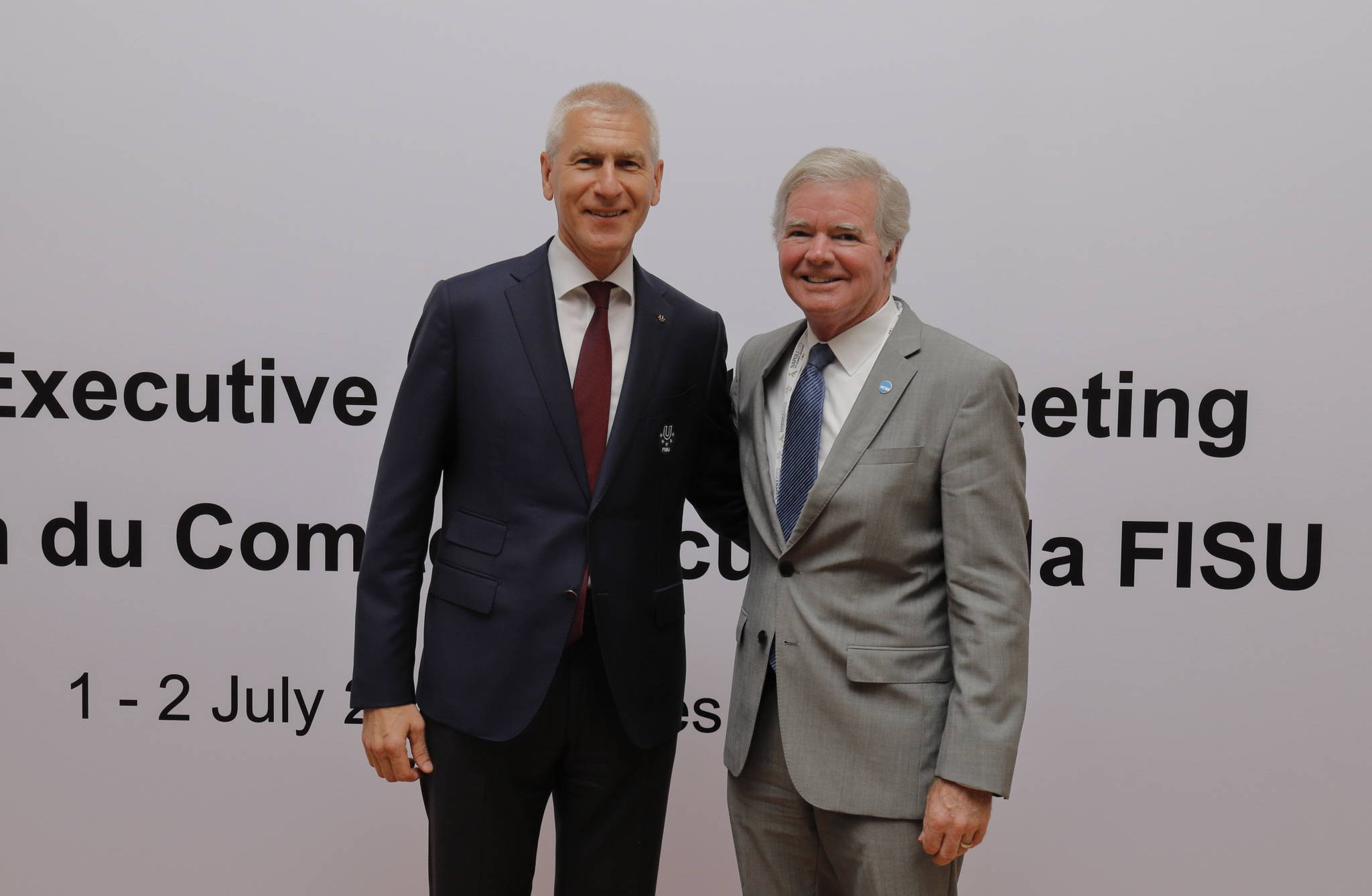 FISU President Oleg Matytsin with NCAA President Mark EmmertNAPOLI – With more than 500,000 competitors across 19,000 university teams from 1,100 universities, America’s National Collegiate Athletic Association (NCAA) is a sports behemoth.
FISU President Oleg Matytsin with NCAA President Mark EmmertNAPOLI – With more than 500,000 competitors across 19,000 university teams from 1,100 universities, America’s National Collegiate Athletic Association (NCAA) is a sports behemoth.
The NCAA is an economic force as well. Mostly through broadcast marketing rights for its popular sports properties, the NCAA generates 3.3 billion dollars annual revenue. As a non-profit organisation, these funds turn into direct revenue for the member universities, and to student-athletes competing in NCAA events through academic scholarship and cost-of-living allowances.
The NCAA President, Dr. Mark Emmert, met with the FISU executive team on the second and final day of their biannual meetings at the Napoli 2019 Summer Universiade.The head of the high-profile organization addressed a wide variety of topics during his presentation, ranging from the NCAA’s successful marketing model to the governing body’s relationship with FISU and other national federations.
FISU Media caught up with President Emmert following the session.
Question: You attended your first Universiade in the summer of 2017 in Taipei. How was that experience?
I had a wonderful experience in Taipei. It was so impressive to see thousands of student-athletes from around the world enjoy each other’s company. I had a chance to watch a number of events and the level of competition was very high. I came away from it very impressed with the whole model for the FISU Games and became a big fan. I had been meeting with some of the leadership in the past and was aware of the activities of course, was trying to be helpful, but I hadn’t had a chance to personally attend the Games before. It was important for me to see it with my own eyes.
Q: How is your experience in Naples so far?
A: I just arrived yesterday but there’s a basketball game this afternoon, the Americans are playing Mexico, so I’m going to go watch that. And then I’ll be here for a few more days. I’m really looking forward to it.
Q: FISU and its flagship events, the Summer and Winter Universiades, don’t enjoy the same level of visibility and popularity in the United States – and even North America as a whole – as they do in other regions such as Europe and Asia. Why do you think that is?
A: First of all, hosting a FISU Games in the United States would be very valuable in building recognition. In the U.S., college sports is so well established, so well recognized that people automatically give their sporting attention to the university of their choice. If they’re a fan of a particular university, they follow it, and most of them are just not aware of these (FISU) Games. But I think if the timing was right, especially in the summer, in July and early August, when there’s not a lot going on in terms of college sports, hosting the Universiade during that period would be very valuable. It’s important to build brand recognition for the FISU Games in the U.S. because we have such a rich history of college sports.
Q: In the meantime, of course, Lake Placid will host the Winter Universiade in 2023. How exciting is that?
A: I’m extremely excited that the Winter Games will be back in Lake Placid. For Americans, Lake Placid is a very storied place, a magical place. That’ll be great fun and it will give us a nice boost, for sure. There’s no doubt it will be an outstanding event. As for summer, I would hope that in the near future we can have a Games somewhere in the U.S. as well. It could be very exciting.
Q: Where do the Universiade currently fit in the NCAA sport calendar? How big a deal is it for schools to send student-athletes to the Universiade?
A: It’s not as big as it should be. When you talk to students who have gone, they all think it was one of the best experiences in their life. They love it, they think it’s fabulous. We’re starting to grow it now, grow attention to it, because we’ve been sending whole basketball teams to represent the U.S. in that sport, for example. This year, the Clemson men and the Mississippi State women are here, so other schools then say “Oh! Clemson is sending its team and Mississippi State is sending its team”, and then they start competing and wanting to be part of it. I think that can grow very fast. We want it to be something our athletes aspire to.
Q: How is the next NCAA season shaping up?
A: We should have a wonderfully exciting football season. It always is, and this year looks particularly good because there are no clear favourites for the championship, it’s going to be very competitive. Our basketball seasons, both women’s and men’s, are always pretty crazy, I always love it when we get around to March for our tournaments. We’re also seeing a rapid growth in women’s softball. It’s becoming very popular, TV audiences are growing, people get excited about it. Women’s volleyball, both indoor and beach, is growing in popularity too, lacrosse as well. We added beach volleyball only three years ago. Kids love playing it and it’s fun to watch.